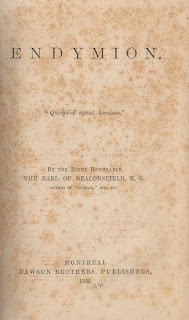Blantyre—Alien
Alan Sullivan
London: J.M. Dent, 1914
265 pages
Brian Blantyre is ship's doctor for the transatlantic steamer Harmonic. The position isn't at all taxing. It's rare that Blantyre has to deal with anything worse than the occasional case of mal de mer – whatever might be more serious is invariably passed on to hospitals at ports of call. A bored man, mild interest comes in attending the unwashed masses in steerage, many of whom have never so much as seen a medical man. For Blantyre, each voyage is the same as the last, until he spots Canadian beauty Stella Blake ascending the gangplank in New York Harbour.
Should that be "Harbor"?
Never mind. The important thing is that Stella stands out amongst the many, many thousands of passengers Blantyre has encountered over the years. After a few days at sea, he invites Stella and her travelling companion, spinster Aunt Catherine, to tea in his quarters. There he learns that Stella was orphaned at an early age, and that her "elderly" aunt – she is, after all, fifty – dedicated her life to raising the girl.
But Stella is a girl no longer. At twenty-five years of age, she's inherited a substantial fortune amassed by her long dead father. Blantyre has something in common with Stella in that his Anglo-Irish family once had money itself.
At the end of the Atlantic crossing, Stella and Aunt Catherine disembark at an unnamed Italian port. They spend two weeks or so exploring the countryside before a cable catches Stella in Rome: "May I come? – Brian Blantyre."
Stella's positive response owes everything to the sudden realisation that she's in love with Blantyre. Unfortunately, the impending reunion is marred somewhat by a marriage proposal from vacationing Canadian physician Stephen Ellison. Mere minutes after she declines, Blantyre arrives. I'm pretty sure they have sex:
She relaxed in his embrace. Very gently her lips were turned to his. A wordless space in which she felt only the strength of his arms, and then in the shadowed screen thrilled out a tiny voice. It rose and pulsed and paused, and ere its chain of melody broke there chimed in another and another throbbing sweetness, till the whole invisible choir scaled the heights together.The coupling couple soon wed. With a bit of encouragement from his bride, Blantyre resigns the post on the Harmonic for a new life in Stella's hometown of Yorkton (read: Toronto). A few weeks later, Mrs Blantyre uses a minuscule portion of her inheritance to buy into the practice of a respected, elderly physician (he's even older than fifty). It turns out to be not the best of partnerships. Blantyre would've done well to consult Ellison before contracts were signed. For obvious reasons, Stella made no such suggestion.
 |
Stalled, the plot settles into vignettes concerning Blantyre's practice. A selfish society woman asks him to perform an abortion (he refuses). A consumptive young father pleads with the doctor to lie on an insurance
application (he refuses). In one of the novel's most dramatic scenes, Blantyre is called to the home of a man named Parkinson, who takes his own life by consuming.... what exactly? Blantyre's efforts to save the man didn't involve a search. Moments after Parkinson expires, Ellison rushes in and finds an empty bottle of aconite under the dead man's desk. If only Blantyre had known! Parkinson might have been saved!
Or maybe not.
Blantyre's failing has no consequence. Life continues apace, enriched by his relationship with Stella – but herein lies the novel's greatest flaw. That Stella loves her husband is both stated and shown. The more reserved Blantyre appears much, much more than content in the marriage; so, it comes as a surprise when, well into the novel's second half, one of their acquaintances labels their marriage a failure. It comes as a much greater surprise when, even later, Blantyre expresses the very same judgement.
It's true that no one knows what goes on behind closed doors. But Charlie Rich shared, and so does Alan Sullivan. We see enough of the protagonist's married life – which, I think worth noting, is by far the most sexually active in a Canadian novel published before Harriet Marwood, Governess – to question everything that had gone before.
I felt deceived, but not nearly so much as Mrs Blantyre.
Strange: On the newlyweds' voyage to Canada they encounter a "former Canadian Prime Minister, now in opposition" who is described as "an old-world Gallic type."
Laurier, right?
Makes sense for a novel published in 1914, except that the scene takes place three years earlier, several months before Laurier lost power. In further conversation, the former Canadian Prime Minister is referred to as "Sir John." The only knighted prime ministers to have borne that Christian name are Sir John A. Macdonald, Sir John Abbott, and Sir John Thompson, all of whom were long dead.
Object and Access: An attractive book bound in red boards with gold type. The final two page are given over to ads for Dent's Wayfarer's Library and what was then the author's only other book.
Dent published Blantyre—Alien in both Great Britain and Canada. I take mine to be the former as its spine is stamped "DENT, LONDON". The novel was also published by in the United States by Dutton.
Blantyre—Alien can be found in the Toronto Public Library, Library and Archives Canada, and nineteen of our universities. As of this writing, three copies are being offered for sale online. The cheapest is $45.43. At US$75.00, the one to buy is inscribed by the author to a fellow member of Toronto's Arts & Letters Club.
The novel can be read here – gratis – thanks to the good folks at the Internet Archive.















































